DIAL project: defining digital identity & practice
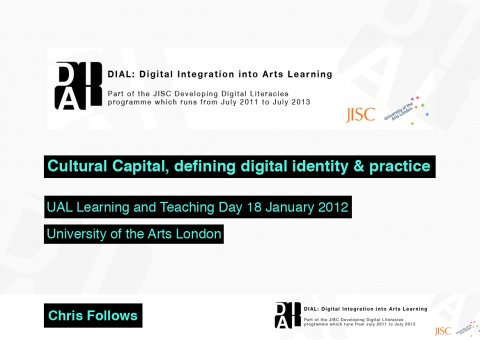
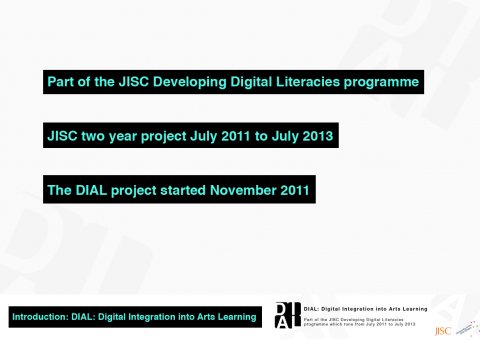
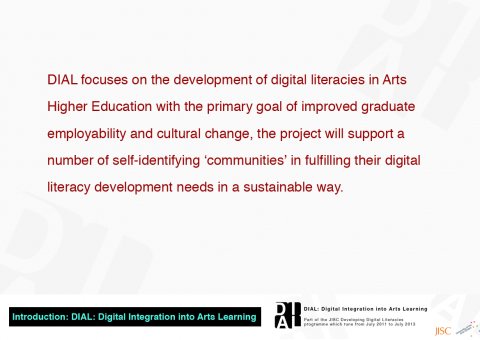
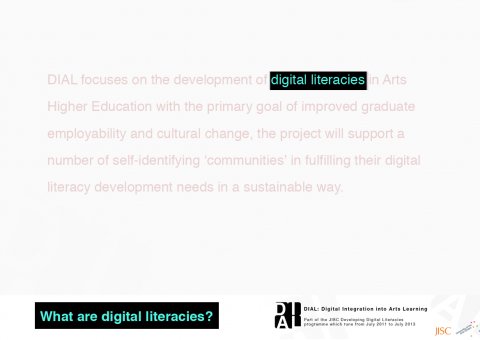
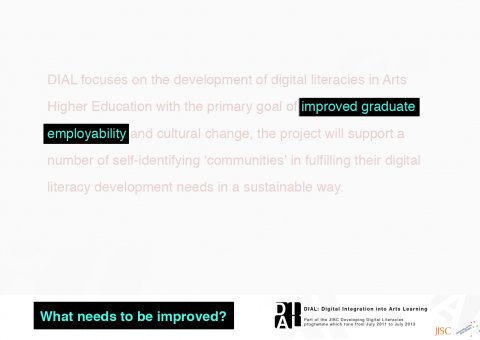
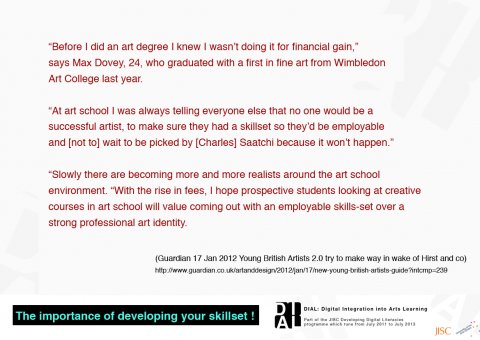
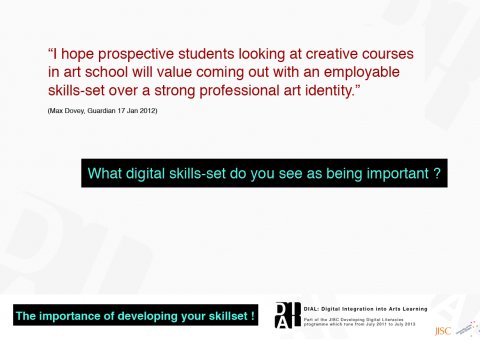
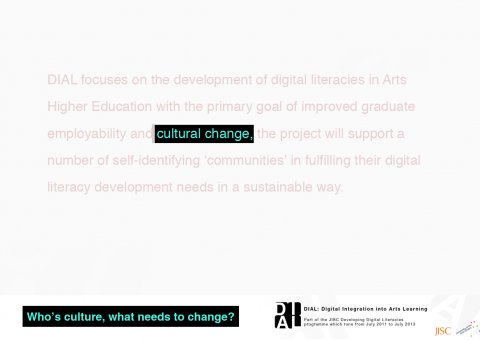
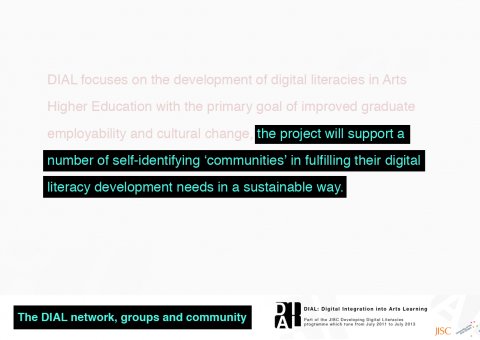

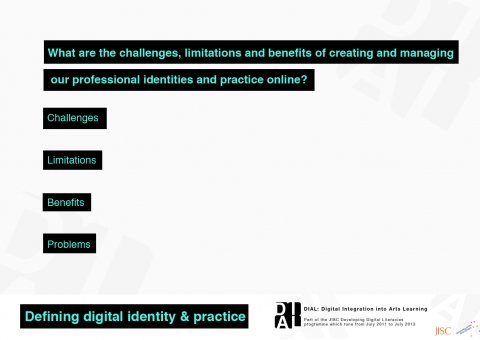


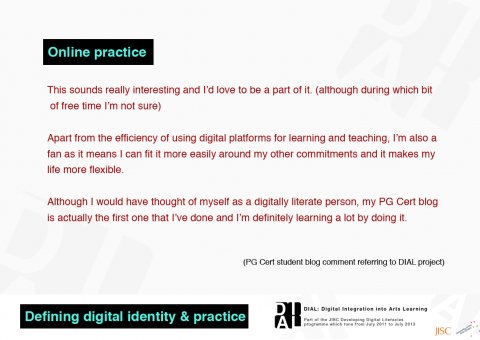
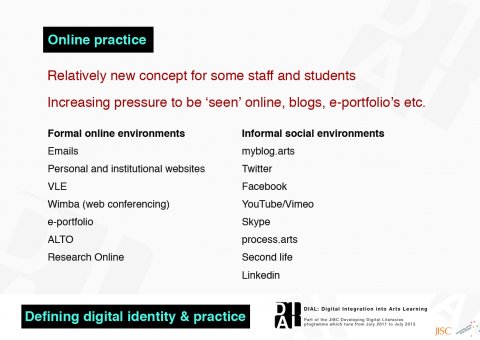
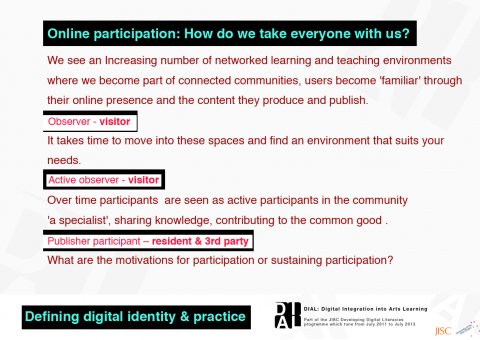
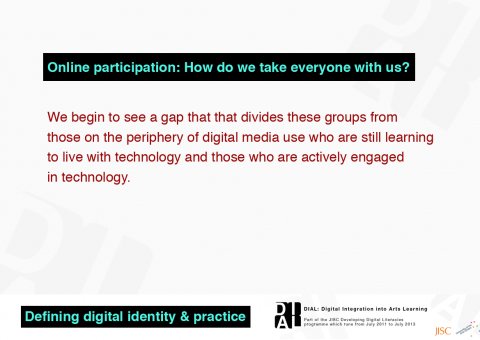
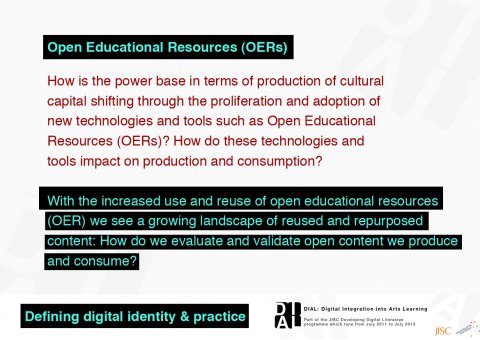
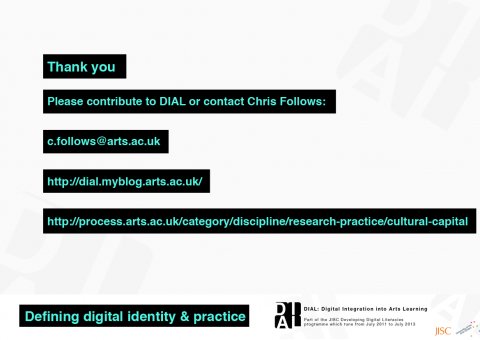
Open discussion 18/01/12 around issues being addressed by the DIAL project. DIAL focuses on the development of digital literacies in Arts Higher Education with the primary goal of improved graduate employability.
The project takes a community-based approach, enabling students and staff to support each other to realise their aspirations collectively and individually. Download full transcript.
View and download a SlideShare copy of this presentation - http://www.slideshare.net/ProcessArts/dial-presentation
Transcript DIAL Project – by Pamela Kember (25/01/2012)
Cultural Capital, defining digital identity & practice
UAL Learning & Teaching Day 18 January 2012
University Arts London
Chris Follows (C F)
C F: Thank you all for attending this session, it's nice to see so many people here.
We have got an hour, and I will remain seated if that's okay, and try and keep it as informal as possible and try to get some debate going if possible, rather than me saying what I think, too much.
I will give an overview of the DIAL project and then hopefully put a few questions out there, and try and get some feedback really, as think that probably the most important thing at the moment.
So the project is, DIAL: Digital Integration into Arts Learning, which is quite a snazzy little title, and obviously that means a lot of different things to different people.
This is my first SlideShare by the way, so just to give you some context of where I am coming from. I am involved in digital, quite a lot, but I always feel inadequate as there is always something more I need to know, there something more I need to experience. I have been at the University for seven years, in various different roles, but I am also ex student as well; I graduated from Wimbledon College of Art in Fine Art Painting, so I am coming at it from different angles.
So the project – its a JISC – anyone not heard of JISC? JISC is a huge funding body, and I was thinking the other day, what would we do without JISC? Because there are so many digital projects that they are initiating with regard to digital systems and introducing those into education, and pushing the digital, in education,
JISC stands for Joint Information Systems Committee and they funded the project, they have actually funded twelve Universities, across the UK, a lot applied, 64, applied for this funding, so we are really lucky to get this money. It is a two years project, it started in July 2011, the actually programme, but as there was a delay in starting this project, so we officially kicked of in November, so we are in the second month just going into the third moth, and still very much in the set up stage at the memento. We are still developing the project plan as such, and I think this will inform the project. It is an evolving agile sort of project, I feel.
SLIDE 1
DIAL focuses on the development of digital literacies in Arts Higher Education with the primary goal of improved graduate employability and cultural change, the project will support a number of self identifying 'communities' in fulfilling their digital literacy development needs in a sustainable way.
That's quite a mouthful so let's break that down, I guess the first thing I'd like to open up a debate, a discussion is this term, 'digital literacies' and also to acknowledge that as, you can see it's not singular, but indicating multiple literacies, and what does digital literacies mean to you and to the institution?
You can look at this in different ways: in regards to you personally, also you could say, look at the institute to your college, so I would like to open that up, and has anyone got any first indications about what the term means to them personally?
RESPONDEE 1:...Digital Identities, perhaps about having/being comfortable about having an online presence of identities, like FACEBOOK or using other social media, for professional use.
Digital literacies, is maybe an awareness on how to upload information to platforms like that, to College platforms, where information about yourself, you literally choose to make yourself available. For me its tied in with a bit of your own identity.
CF: That's good, because we are going to talk about identities as one of the themes of this talk, which is going to run in parallel with the conference title and the project, so we will be talking about identities later on.
RESPONDEE 2 (male)
Also, worth to know how to communicate with this media, one must be able to say things in a different way from what we do use at the time. Or for examples, Blogs, is a form of innovation, of communication, also personal websites, as another one.
RESPONDEE 3 (female)
I would say another aspect of 'digital literacies' or a digital literacy really is the ability or confidence to learn independently about how to use a computer learning programme, so how to go about this yourself and that sort of teaching you, and knowing how to ask.
CF, Yes, so independent learner, sort of idea, so you can be at home, or be on a train and learning
R 3: Yes navigation.
CF: But also how to navigate in the time that you have got.
R:3 Yes, when you don't know how to use a programme, you can learn how to use the tools.
RESPONDEE 4: UNCLEAR.
...At the same time it's about getting through what you absorb/learn, to all levels of access. You can think about getting open access. A lot of people are really touching these things....
CF: Exactly, yes, that's important to remember and this is the notion of that title, is vast. Honestly, it encompasses everything, and its quite nice to get individual perceptions.
R 5: UNCLEAR. We can teach getting information and finding information.
CF: Yes.
R 6: Where to go to get/find information you are looking for, to select it, as we need information more and more information for work.
CF: Yes. Has anyone spent two hours on Google, trying to find something?
R: YES! (In unison)
CF: So maybe if you had had information literacies, that prove ways of navigating and finding content, you could save, time, and that is a recurring problem coming up constantly, is - I haven't got time for this - So it could address fundamental ways you actually practice.
Anymore points before we move on to the next Slide?
R 7: (male) We need to find information to SELECT it.
C F: Exactly, being able to make a decision about what is more appropriate for you.,
R 8: It also struck me that there are layers of other literacies, existing literacies, media literacies, and the way different media use. In way where digital literacies above all of these others so if you don;t know how to use this,
C F: Yes. We will move on, as, obviously, this is an endless discussion, I think, and also a lot of things hopefully for this project, that will keep occurring, as well as lots of new things. As time goes on, and as technology improvements happens, as new things happens, new problems encountered.
OK so next, or at least one of the primary goals of the project is – Improved Graduate Employability – which is also extremely topical at the moment, It would be good to talk bout that. I guess the way I feel about that as a student or teacher- is what's been taught, during the time that you your time at UAL and thats preparing you for industry for practice, and what with regards to digital literacy- and what are the key...I am unaware of UAL, and this is part of the project, in regards to a base line, in terms of getting an overview- a landscape of UAL what processes there are in place, indeed are there processes, do we need skill sets, do we need to acknowledge that students that come in, need to maybe be assessed .
I have worked in digital media with students on Foundation course, and there is a presumption that students, they are young and know what they are doing, yet pretty much 90% of students have never been on photoshop before, and that they would use words for constructing images- montages,. Again this his is going back to last week when it was declared that schools were restructuring their RCT, so this is great, so suddenly rethinking it- not pushing WORD so much but looking at more creative aspects as well. This is really good for the sector, but what happens if we don't keep up with that? and we then suddenly, have, or do have students coming up who are years ahead of the institution. We are sort of encountering those problems at the moment. I have observed those problems, in regards to running out a BLOG, so of course let's run out a blog. It's a presumptions that everyone runs a blog or hopes you run a blog. But how do you run a Blog? How do you run a Course blog, As students, how do you engage with a blog?
So I guess those sorts of skills can prepare a student for employability, and then you have got applications as well, so I'm just putting that out there.
R 9: Transferable skills, use for industry, it doesn't matter what they studied but to prepare themselves, for opportunities to learn digital literacies and enable/make their CV better more versatile for potential employers
CF: Has anyone ever had the their Digital knowledge assessed? Or How do your teachers know where you need support? What are the processes in place.
R 10 Form assessments, experience, I remember at interview- checking out my Blog, and learning about this, so this is one way of looking at digital literacies. [UNCLEAR]
CF One for me is when you apply for jobs. Especially at UAL, when you put your key strengths down, and so in a way thats logging where you are at that point, then you can think, then you can look back say a year later and its nice to see that God, and you think, I know all that. There is no way of projecting that.
R 11 One of the things you always do is looking at things like applications on line, and what the assessment of documenting someone's digital literacy, in terms of where you stood, what you are applying for, and digital different subjects. [UNCLEAR]
CF: I think there are different subjects, if you are a Fine Art painters, What is important? what digitally is important?
R 11 – Exactly, obviously to your needs.
R12 I had to have a test a practical test, and although a long time ago, also we actually had a course here that used a CAD CAM? And we were finding on the course, students of different ages, and different abilities, using computers a lot and using software, didn't know how to save, so we can do some tests during interview, not so that we can say 'no' you can not come on the course or not but we can preempt or tell who needed more support, and if we could maybe put something in to do some basics.
CF: Yes, I found that useful myself just getting an overview of what students know. So you can gauge where to support,
R!2 It was a very basic test, Can you do this, can you save that?
CF And again, you keep thinking that it is not just about implication, but information literacy's, navigating, and searching for things.
R13 Following on from that, something that happened with my students and the induction group, separate groups, I do a questionnaire on their digit technology, blogging, from online to use of digital technology Smart Codes and their aspirations what you want to get out of learning DL.
CF That's good for our base line
R13 It makes our job easier, so you get a full survey
CF:On that thought- I would like to get all your email addresses, to follow up.
VOICEOVER
R14 Something that happened across the Board, is how we are being taught how to learn digital literacy, and what is fundamental for students, what's going on when their producing a kind of finished product. What is happening on their computer. Because everyone,whatever their background are taught how to use these complex tools, once it's been made. This is what teachers have been telling us, there is a problem that their experiencing of using these tools comes with a fundamental misunderstanding of how they work.
CF: Yes,Yes,
R14. Whether its something like formats, and working with different formats, how it works.
CF: Yes, There's a sort of a smash and grab, like me, with the Slide show just now..yes, FACEBOOK..login with that...upload..done..
R15. UNABL TO HEAR
CF: I somehow have got 20 slides I don't know quite how I managed to get 20 slides, so I'd better keep moving, as there are some meaty questions. So I'll continue.
SLIDE 6 What Digital Skill-Sets Do You See as Being Important?
This came out yesterday in the Guardian and the way I found out about it is on the Process Art Facebook, which Max is a member of, the Process Art Facebook group/team, this was a lovely article in there, and these quotes are quite interesting. So this is a Graduate at Wimbledon College of Art, who graduated in Fine Art, so it is quite interesting what you are saying in regards to getting insight into a student mindset, and that importance of digital skill-sets, and our students related to this. Is this where we are going? In regards to thinking about the employability, aspect and why students come up to a course? What they want to get from it, apart from having choices.
R16: Well, a very funny anecdote, the best UAL Fine Art Student last year graduated and is working in our department as AV support, she met the Rector at some UAL event for the best Alumni, and he was shocked to find out that she a lowly job at LCF, But the reality is,( that you have a job). She failed to ask him what do you expect from a Fine Arts degree.
CF; Again, expectations.
R 16 There are very few jobs.
CF Still I though that [theses quotes] was quite nice to just put up there. To focus on what the student seems to be saying is What skill sets do you see as being important I think we have pretty much covered that.
SLIDE 8 Cultural Change.
CF: This is a big ask, for a relatively small project in a big Institution. What does Cultural change mean? I guess in order to think of one of the big aspirations of the project is to embedded the notion of digital literacies in the Institution, colleges courses, If that can be done, not in the whole institution but little pilots with individuals, and say "Look, This is the problem, this is what we would like to address and this is how we addressed it. If we can have examples of ways people have done it that can feed into and adopt to other people's approaches.
R 17 I would just say one thing, it seems to be that UAL has a problem at the moment, there are at least three groups now, first- perspective students, before they arrive here, then you have got the ...existing students..who you have been talking about so far, and then the third group, that graduate - the Alumni, and life long learning, from from when they are 16 into their 30s, their contribution. It's really about their long term commitment rather than just the three years they do their degree.
CF Exactly, I agree, that is one of things we flagged, that we would like is an institutional look at itself in how it looks at all those aspects, deals with ...Alumini, students coming in..looking at itself as a digital literate institution, place. It would be good to have a senior managers team, that address those issues, that may be fed down to everyone else to say the leadership is thinking this, but also not just on the ground level, because that's happening anyway, but need to see it happening at the Senior management level.
R 18 One of the cultural changes would be to have more 'open practice' as well as part of digital literacies?
CF Yes, I think this area in which we are just talking about, is open cultural resources, that was a big change for the Institution to adopt, greater commons license,[ UNCLEAR ]was embrace, the notion of the open education resources. As we are finding with doing the the ALTO UK project, that's a problem for lots of institutions, about releasing the content, as this is starting to be addressed by the institution as a starting point, which I think is really good, hat can now filter down, because we have got the policy in place, and try to make it happen on the ground, and that's where we are, at the moment.
R 19 Students coming in.. all sorts of students coming in,, so its difficult for the Institution, ..that kind of access so that student working on digital learning can..eventually it becomes part of the curriculum, but it takes time to catch up.
CF: Yes, that's great. When Process Arts was developed it was developed with that sense having students and staff at the same level so there's examples on there of students recording in their studios, still and talking to each other. There was an example the other day of one of our other forums of where a member of staff saw someone, a student doing a WEAVE? Demonstration, the students were all filming on their I phones. What happened to those films? They should share, put them onto, so that other people can see them.
R 20 Also, in addition to Cultural change, there is Institutional change we talk about individual cultural change... I really like the notion of institutional Digital Literacies- to give you an example, a few years ago I was at a large University on the South Coast of England, there was a group of Chinese students, bringing in loads and loads of money- what was needed induction for all of these students before they come, , as there is a high drop out rate, for lack of induction ...before, the institution was not able to provide online education for these students, so the institution, could not accommodate these students. So what [UNCLEAR ] did, they did was set up a rogue installation? Institution? on Google for theses students and register them all on line. This was completely outside the digital picket fence of the Institution. If the Institution was on the ball they could recognise look at changing our system.
CF: Yes, and there are examples of that here. So basically there is a lot of stuff as we are finding out. How are we going to do this? This is where the idea of the project is to get 'self identifying communities', so in a way these problems that are coming up are self identifying, and we are looking at, first of all, trying to identify these communities, and basically see that there is a problem, and then acknowledging that there are probably another, 20, 30 40 people who think the same and so it is about bring those communities together, which is DIAL's aim, and support that group in achieving their gaol. Whether they want to road test an idea, and also to get the people that are experts, or some some sort of experience of the problems, get them, to talk to one another, those who have problems, and its about creating that platform that doesn't exist at UAL in regards to and in our early scope of this project, a students Union representative recently said that the Colleges are 'sold' as six colleges, but actually its all quite siloed in regards to everyone does their own thing, and no one really talks to each other, and so that's been identified and that is reoccurring theme that is coming up as an issue.
SLIDE 10
CF: That's basically what we are trying to do with the project. We are still in a set up stage at the moment, but we have four confirmed groups who have come forward to say this is what we would like to do. So we have:
Online Reflective Practice, and Lindsay Jordan is going to lead that group, and a although she will be doing this her section in regards to PG Cert., this group is relevant to lots of people, so its not exclusive is it Lindsay? ..its fully inclusive and it can mean a lot of things and Lindsay is working on this.
Lindsay- Defiantly,
CF:We have got an Information literacies, group forming, there with Jess and David. That's going to be interesting in regards to how to navigate and find information.
Then we have got the Open Education at UAL which John and I are leading which is basically reflecting on ALTO and ALTO UK and what we are doing there.
One that has just come in, is Presentation Skills which is Laura North, and which in preparation for this I looked at some of those materials, and.. great. .suddenly there is a whole link to stuff
and information on presenting digital presentations, and it reminded me about Slide Share, and should we use Slide Share?
So that's going to be a really interesting group, as I've had no training in talking on Window, or Skyping or doing Conferences or doing Presentations and I thinking the idea is that this is not about identifying problems and saying look you need to go on a course, this is about letting the community solve those issues in a more sustainable way and in regards to building a community dialogue, and that is a very important because, this is not a hugely financed project, and that it is not the case that you can keep chucking money at it, but also that there are systems in place, and I am just coming to LEARN IT And LINDA.COM, so hopefully that stuff will start to rise and when someone has a question they can find it a lot easier.
SLIDE 11
What are the Challenges, Limitations and Benefits of Creating and Managing our professional Identities and Practices online?
So that was the DIAl, now in the last fifteen minutes, I am going to focus on the notion of identities, for if DIAL is going to work, we need to address the problem of people putting themselves out into the world and putting themselves. And being part of an online community, and on line discussion and I think this is difficult and things to be address. One of the key things in Identities through online practices. So you have got your:
Challenges
Limitations
Benefits
We will quickly go through these? Spending a minute of each. Has anyone any challenges with putting yourself out into he world.
R: Im doing XX assessment, and we are writing up a Blog, about what we are doing. And I think a lot of people are having a really difficult time with idea of publishing this Blog, open to anyone, because you are worried about your students finding it, and I'm not quite sure what to do, really what the actual problem is, if its really wrong that the students are reading about you learning how to teach them, and its got everyone a bit nervous about it.
Have we got any students here?
R: Yes
R. What do you think about your tutors learning how to teach?
R: Well that will be a first!
CF: Course it is! I find it interesting Im reading these Blogs all the time
R: I think it is really important [Unclear]
R: Yes it would be good to see.
R: Maintaining your privacy online. Yet people say I don't want people to read mine, but like to read other peoples!
R: That's part of digital literacies is to challenge that wall between the audience and connections with the internet, and the whole idea of privacy, is maybe acceptable, but what is private, - you get into your sexual orientation, [UNCLEAR]
R: Blog identities
R: Its about building yourself up, I don't think most people use a nickname.
R: Now we are moving towards sharing what they are doing, - whether bad or good, is the notion of sharing.
CF: We could jump straight to benefits. What is the benefit of having a closed Blog, and Open Blog? Its to engage with new people. Like being on Twitter, I engaging with people t UAL through twitter, there are benefits arising with regards to connection.
R: Just to add to the whole discussion about engaging with the internet and digital literacy, is that it is very much to understand there is a world out there, in your control that there is a world out there, and what you put out there, and how you manage that.
R: The other factor is what you say and how you say it which you have more control over.
CF: I'm going to have to jump on, but you can bracket that in Problems - as there is the idea of 'over time', for if you put something out two years ago, you want to recall that. You want to have the ability to take that back or update it. That's what the benefits are, you are also constantly in the public eye, so you are continuing to Progressive practice if you like.
OK Here is an example that you can't really see very much, but this is Philip White, at Camberwell
which is a video I did in his studio two years ago, 25,000 views, comments from all over the world. Philip's is a great story, he started out doing this sand casting process in his studio, and wanted to project it out to the rest of college. He was not digital savvy at the time and so I filmed and did the editing and we put them out to the world, and made 150,000 hits so far for those three videos.
And also when you put yourself out tot he world there are new problems – Am I fielding comments
from the world here? - So its great all the encouragement, from America, that someone found this really helpful, and they learnt more than they could find in a book. That the benefits for him, was that instead of seeing sand-casting in another video on You-tube, filmed by some guy in Texas in his flip-fops, pouring molten whatever, that he is showing it the way he likes it to be done.
There is another question here about
Can you just tell me know how to make bullets?
[LAUGHTER]
We answered most of those question, only not the one about the bullets, just in case it came back and bit us on the behind,
SLIDE 13
I'm just going to fly through these slides as we only have six minutes left
So, Its about demonstrating our skills and professional practice online – a bit like Philip was doing.
We are also Looking at what your identity says about you? What you put on there, as obviously you can build your online identify over time and how you managing that and knowing how to mange your identity. So when people go people can say, when you go. So if you go on an email and you have a list that big, of stuff, you maybe need to point them towards another way of assessing what you are about, and Blogs are a good for doing that.
We have been talking about Changing Practice, and what's quite interesting is what I pulled off Wikipedia, just before it went down, is Professional and Amateur this notion of professionalism, and that's been questioned in regards to – the Art School as a creative place – I went to a talk about the changes in art schools, where one of the artists commented that we are in danger of it becoming like an American dentist- so sort of perfect and professional. So its about balancing that sort of amateurism as-well, its also not being scared about to put yourself out there as an amateur. I'm an amateur and PEARL? is an amateur.
R: About honesty- being true?
CF: Yea, and not worrying about being too polished, It's a long road..you might have put something out there, but you may do it a bit different next time.
SLIDE 14 Online Practice.
Ok This is a Blog comment I pulled off the PG Servers, again its quite interesting talking about Blogs and the first time they've done it and the benefits.
R: That's Mine!
CF: That's yours is it? See you are there, you are out in the world! You see I left you anonymous,
R: So you didn't have to check with me
CF: Its online, but its anonymous here.
SLIDE 15
So here we are looking at the different ways, from an institutional perspective- a formal online environments.
You put already ourself out there by
Emails to a group
You have VLE, anyone been on Wimba, and there is a push on E portfolios at the moment, and ALTO we have talked about, and people are creating their own Personal websites, and also a lot of Profiles, institutional and profiles of High up Academics, and Senior management and people doing great stuff at University. But would be nice to have Staff doing great stuff.
R: In normal social environments, Is it recommend you have a presence on all of them.
CF: You just pick your thing, basically,
R: It's quite intimidating
CF: We'll get there now..so we have..
myblog.arts- internal blogging system which is fantastic and that's what the DIAL Blog is on at the moment.
Twitters – I'm finding really interesting for connecting with people I'm sitting next too.[Laugh
Face-book - yes
You-tube – Is really good for putting myself out to the world as we've seen.
Skype – I'm skyping all the time now
Process.arts – Is something I developed over two years and still ongoing, Its not a funded project by the University. [I was paid to run that site?] NOT SURE
Second Life – I never use .
Linkedin – I never use. I'm on it, but I never use it.
We are pretty much out of time, but these are the different again what we have been talking about- as an Observer- you can sit on the outside and just see what's going on, or you can be an Active Observer – to engage start to put your comments on there, and over time you become a publisher and an active participant within that community. And its about finding a place to live, I live on Process arts at the moment, thats a place I feel comfortable to live, online, and I'm on Twitter occasionally, that's my place.
Its about how we take everyone with us, really I think that one of the key things of the project,
is to try to acknowledge that. But there is this notion that if you are using other people's content,
that we touched on this earlier that you are becoming quite blended, in regards that you could be made up of , or create a resource, and that's important about Open Education Resources
re- use sue of stuff. Its about, one, saving Time – so if you can find content quickly- someone's done a great lecture you can take, it saves a lot of time and building that resource, that back up.
Its about preparing, and its a long road, in regards to knowing where to find content when you need it and the sort of quality, useful content.
One minute over.
So. Thank you very much. You can go to Blog which is there. It is, dial.myblog.arts.ac.uk/
Where basically everything is on there as to this is a the kick-off Blog and its talking about the set-up process. We are going to develop a fully functional community website and anyone interested in kicking off a DIAL Community- please contact me via any of those links, and we will either join you through a group that is already forming or we will start a new group up.
And ..that's it from me
Thank you very much.
Oh, I recorded this- does anyone have any objection if I put this out? Please shout out now,and I wont..
END
This presentation aims to encourage feedback and debate around the challenges, limitations and benefits of creating and managing our professional identities and practice online.
We will discuss the work of the DIAL project (Digital Integration into Arts Learning) and how the development of voluntary networked support communities can support development in this area.
Authoring published content, which is ‘open to the world’, presents new problems and challenges for staff and students. We begin to see a gap that that divides the two groups from those on the periphery of digital media use who are still learning to live with technology and those who are actively engaged technology.
How does this possible inequity effect the learning and teaching experience and future employability? How do we make explicit the unique tacit experience of art and design learning and teaching, and how does the use of video, image and audio documentation used to capture and share the art and design practice effect or alter the face-to-face experience? With the increased use and reuse of open educational resources (OER) we see a growing landscape of reused and repurposed content:
- How do we define our own identities in this new landscape
- How do we best represent ourselves online and assess the profiles of others?
- How do we evaluate and validate open content we produce and consume?
- What are the most effective communities for surfacing our professional identities?
- How do we manage and evaluate communication and feedback in this new open space?
Please contribute before the event here: http://dial.myblog.arts.ac.uk/ or email c.follows@arts.ac.uk
How will students be involved in this session?
Student feedback will inform the development of the DIAL project.
What will participants take away from your session?
Understanding of the DIAL project aims and objectives and hopefully a sense ownership and involvement in a DIAL project and the identified communities.
Chris Follows - c.follows@arts.ac.uk
UAL links
myblog.arts – http://dial.myblog.arts.ac.uk/
Process.arts - http://process.arts.ac.uk/category/discipline/research-practice/dial
Workflow - http://workflow.arts.ac.uk/interaction/forum/view.php?id=65
Social media
Twitter - http://twitter.com/#!/dialproject
Scoop.it – http://www.scoop.it/t/developing-digital-literacies
Facebook - http://www.facebook.com/pages/Dial-Digital-Integration-into-Arts-Learning/140558392717560?sk=wall
#digilit – http://twitter.com/#!/search/%23digilit
#jiscdiglit – http://twitter.com/#!/search/%23jiscdiglit
JISC and general project documentation
The design studio, JISC resources and suport –http://jiscdesignstudio.pbworks.com/w/page/38511966/digital%20literacy
Main JISC project page (all projects) –http://www.jisc.ac.uk/whatwedo/programmes/elearning/developingdigitalliteracies/dial.aspx
JISC CETIS, the Centre for Educational Technology and Interoperability Standards –http://jisc.cetis.ac.uk/
| Attachment | Size |
|---|---|
| dial_transcript_edit..doc | 64.5 KB |

This image, DIAL project: defining digital identity & practice, by Chris Follows is licensed under a Creative Commons Attribution 3.0 Unported license.


